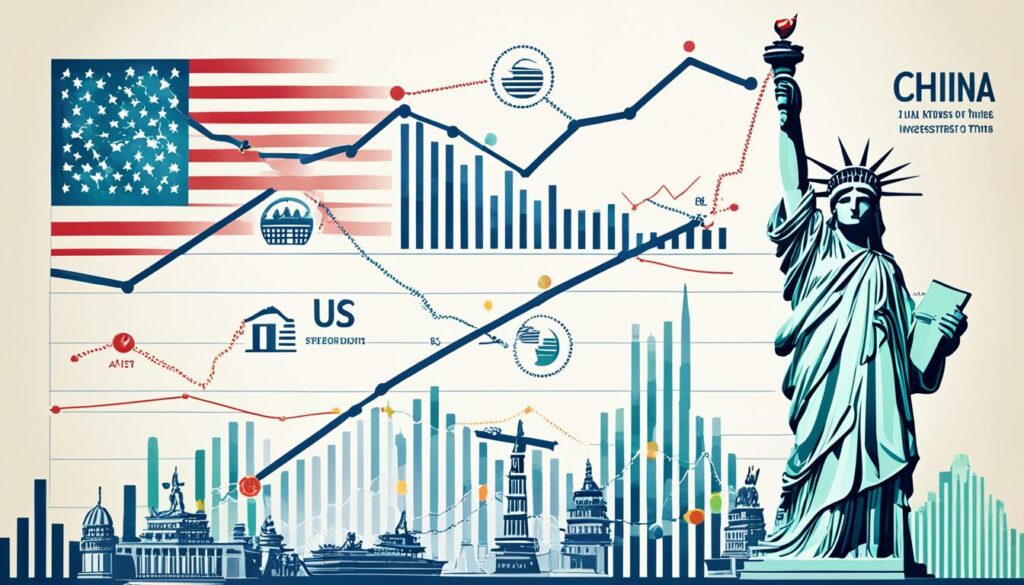China is a key player in the world’s economy, especially in trade with the US. The relationship between the US and China is complex and affects markets worldwide. We will look at how this relationship impacts different sectors.
Key Takeaways:
- The US and China have a significant economic relationship, with China being the second-largest global economy and a top trading partner of the US.
- China’s integration of state and corporate interests allows it to employ trade tools, economic coercion, and IP theft, which benefit its firms.
- The trade conflict between the US and China has led to a reduction in trade, causing disruptions in supply chains and heightened market uncertainties.
- While the trade relationship has its benefits, such as lower prices for US consumers and export opportunities for US companies, there are concerns about job losses, national security, IP protection, and unfair trade practices.
- US policymakers and businesses continue to grapple with the future of US-China trade relations, which remain uncertain.
It’s important to understand the dynamics of US-China trade. This knowledge helps in the current global market. We’ll cover trade and investment, key issues for Congress, and effects on businesses and investors.
Trade and Investment
In 2023, China became the United States’ fourth-largest goods export market. The trade between them was worth $147.8 billion. At the same time, China was the second-largest source for US imports, totaling $427.2 billion. The trade dispute has changed how the two countries interact economically.
Because of the conflict, US exports to China fell by 5.1%. US imports from China saw a sharper drop of 20.4%. These numbers show the big impact of tariffs and trade barriers.
The US and China trade in services as well as goods. In 2022, China was part of 4.5% of US service exports and 3.8% of imports. This shows the wide range of their economic dealings.
The conflict affects more than just goods. It also impacts firms from both countries operating across borders. In 2021, US-owned businesses in China made $471.6 billion in sales. Chinese-owned firms in the US made $65.5 billion. This shows how deep their economic ties go.
The trade spat has also influenced foreign direct investment (FDI). In 2022, US FDI in China grew by 9%. But, China’s FDI in the US fell by 7%. This reflects the conflict’s effect on investment flows.
The trade and investment relationship between the US and China is now more complex. Their interdependence in trade, services, and investment makes the economic challenges they face significant.
US-China Trade and Investment Data Highlights
| Year | Total Trade (in billions) | US Exports to China | US Imports from China |
|---|---|---|---|
| 2023 | $575 | $147.8 | $427.2 |
| 2022 | N/A | N/A | N/A |
Key Issues Facing Congress
The trade ties between the US and China are complex and ever-changing. Congress needs to focus on this. The Biden Administration sees the competition with China as a strategic challenge. They want to beat China in many areas with a smart trade plan.
Investing in US innovation is crucial for being globally competitive. By supporting research, tech advances, and local industries, Congress ensures the US stays ahead. Especially in areas important for trade with China.
Improving strengthening supply chains is another goal. The COVID-19 pandemic showed how fragile our supply system is. Congress is working on making it stronger. They’re doing this by supporting US manufacturing, encouraging companies to move back to the US, and working with friendly countries.
“Congress has been deliberating on approaches to address issues such as digital platforms, data security, foreign investment reviews, and export control licensing decisions.”
Digital platforms are big now, and data security is a huge concern. Congress is trying to keep our data safe while keeping trade fair. They’re looking at laws for cybersecurity, data privacy, and strong rules against threats from abroad.
With Foreign investment reviews, Congress is looking closely at Chinese investments. They want to make sure these investments are safe for the US economy and infrastructure. Making the review process better and more transparent is a priority.
Deciding on export control licenses is important, too. Balancing national security and trade is a big challenge. Congress is updating laws and protecting important tech to keep the US’s edge in key sectors.
Using tariffs has been a big move against China’s trade practices. Congress has played a big part in setting these policies. They’re using tariffs to fight issues like stealing intellectual property and unfair trade. This helps protect US jobs and makes trade more fair.
There’s worry about overcapacity in new tech areas and trade uncertainty due to US-China tensions. Congress is making policies to deal with these problems. They’re focusing on fair competition, protecting intellectual property, and open markets in key industries.
In dealing with US-China trade, Congress must carefully balance national interests, growth, and global trade stability. By tackling these issues, Congress shapes the future of trade with China.
| Key Issues | Actions Taken |
|---|---|
| Investing in US innovation | Funding R&D, supporting domestic industries |
| Strengthening supply chains | Legislation for domestic manufacturing, reshoring incentives |
| Data security | Cybersecurity standards, data privacy regulations |
| Foreign investment reviews | Enhancing review processes, safeguarding national security |
| Export control licensing decisions | Refining export control laws, safeguarding sensitive technologies |
| Tariffs | Imposing tariffs on Chinese imports |
| Overcapacity and trade uncertainty | Comprehensive trade policies for fair competition |
Conclusion
The US-China trade relations are complicated and matter a lot for the world’s economy. The conflict has made trade drop, messed up supply chains, and made markets unsure.
There have been good things, like cheaper prices in the US and more chances for US businesses to sell abroad. But, there are bad sides like job losses and worries about national security and unfair trade.
The future of how the US and China will trade with each other is not clear. It’s something government leaders and businesses are watching closely. They want to fix the problems to make trade better and fair for both countries.
FAQ
What is the current status of US-China trade relations?
How has the trade conflict between the US and China affected trade flows?
What are some key concerns related to US-China trade relations?
What measures have been taken to address Chinese trade practices?
What are the implications of US-China trade relations for global markets?
Source Links
- https://sgp.fas.org/crs/row/IF11284.pdf
- https://www.cfr.org/backgrounder/contentious-us-china-trade-relationship
- https://www.wto.org/english/res_e/reser_e/ersd202004_e.pdf
Disclaimer
All information on this website is of a general nature. The information is not adapted to conditions that are specific to your person or entity. The information provided can not be considered as personal, professional or legal advice or investment advice to the user.
This website and all information is intended for educational purposes only and does not give financial advice. Signal Mastermind Signals is not a service to provide legal and financial advice; any information provided here is only the personal opinion of the author (not advice or financial advice in any sense, and in the sense of any act, ordinance or law of any country) and must not be used for financial activities. Signal Mastermind Signals does not offer, operate or provide financial, brokerage, commercial or investment services and is not a financial advisor. Rather, Signal Mastermind Signals is an educational site and a platform for exchanging Forex information. Whenever information is disclosed, whether express or implied, about profit or revenue, it is not a guarantee. No method or trading system ensures that it will generate a profit, so always remember that trade can lead to a loss. Trading responsibility, whether resulting in profits or losses, is yours and you must agree not to hold Signal Mastermind Signals or other information providers that are responsible in any way whatsoever. The use of the system means that the user accepts Disclaimer and Terms of Use.
Signal Mastermind Signals is not represented as a registered investment consultant or brokerage dealer nor offers to buy or sell any of the financial instruments mentioned in the service offered.
While Signal Mastermind Signals believes that the content provided is accurate, there are no explicit or implied warranties of accuracy. The information provided is believed to be reliable; Signal Mastermind Signals does not guarantee the accuracy or completeness of the information provided. Third parties refer to Signal Mastermind Signals to provide technology and information if a third party fails, and then there is a risk that the information may be delayed or not delivered at all.
All information and comments contained on this website, including but not limited to, opinions, analyzes, news, prices, research, and general, do not constitute investment advice or an invitation to buy or sell any type of instrument. Signal Mastermind Signals assumes no responsibility for any loss or damage that may result, directly or indirectly, from the use or dependence on such information.
All information contained on this web site is a personal opinion or belief of the author. None of these data is a recommendation or financial advice in any sense, also within the meaning of any commercial act or law. Writers, publishers and affiliates of Signal Mastermind Signals are not responsible for your trading in any way.
The information and opinions contained in the site are provided for information only and for educational reasons, should never be considered as direct or indirect advice to open a trading account and / or invest money in Forex trading with any Forex company . Signal Mastermind Signals assumes no responsibility for any decisions taken by the user to create a merchant account with any of the brokers listed on this website. Anyone who decides to set up a trading account or use the services, free of charge or paid, to any of the Broker companies mentioned on this website, bears full responsibility for their actions.
Any institution that offers a service and is listed on this website, including forex brokers, financial companies and other institutions, is present only for informational purposes. All ratings, ratings, banners, reviews, or other information found for any of the above-mentioned institutions are provided in a strictly objective manner and according to the best possible reflection of the materials on the official website of the company.
Forex/CFD trading is potentially high risk and may not be suitable for all investors. The high level of leverage can work both for and against traders. Before each Forex/CFD investment, you should carefully consider your goals, past experience and risk level. The opinions and data contained on this site should not be considered as suggestions or advice for the sale or purchase of currency or other instruments. Past results do not show or guarantee future results.
Neither Signal Mastermind Signals nor its affiliates ensure the accuracy of the content provided on this Site. You explicitly agree that viewing, visiting or using this website is at your own risk.




